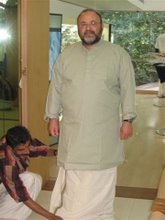Couldn't help but recall this quote, attributed to Napoleon, while recently viewing portions of the 1937 film version of Pearl Buck's The Good Earth. While there is both much justifiable praise and criticism of this work, I was struck by the following text appearing at the beginning of the film, which of course is speaking to the imminent role of China as an ally in the struggle against Japan:
THE SOUL OF A GREAT NATION
IS EXPRESSED IN THE LIFE OF
ITS HUMBLEST PEOPLE. IN THIS
SIMPLE STORY OF A CHINESE FARMER
MAY BE FOUND SOMETHING OF THE
SOUL OF CHINA. ITS HUMILITY, ITS
COURAGE, ITS DEEP HERITAGE FROM
THE PAST AND ITS VAST PROMISE
FOR THE FUTURE.
At the time, of course, neither Chinese Nationalists nor Communists could imagine the "vast promise for the future" that China would eventually take post-1979, and its enormous force in the current global economy. It also occurred to me that the film "Mother India", twenty years later, borrowed heavily from visual representations of suffering peasantry as portrayed in The Good Earth. Well, as for China's future, imagined circa 1937, or even as peasants starved there in the late 50's, "who'da thunk it"?
当中国觉醒时,世界都发颤
我想起这句话,据说拿破仑波拿巴说了,而最近观看由美国作家赛珍珠的赛珍珠1937年电影版的部分。这两种批评和赞美的书和电影是合理的。下面的文字出现在电影的开始。它指的是将发挥作用,中国作为一个在抗日斗争中的盟友:
一个伟大民族的灵魂体现在了其最卑微的人的生活。在这一波我国农民简单的故事可能会发现作者对中国灵魂东西。智能谦逊,勇气,它从过去和对未来的广阔前景深厚资源。
当时既没有中国国民党,也不共产党人可以想像未来“是中国将最终实现”广阔的前景,在当前全球经济中的地位。电影“印度母亲”,20年后,借用农民如何在苦难的大地描绘严重。 1937年,谁能够想到什么中国和美国今天这样呢?
Subscribe to:
Post Comments (Atom)




No comments:
Post a Comment